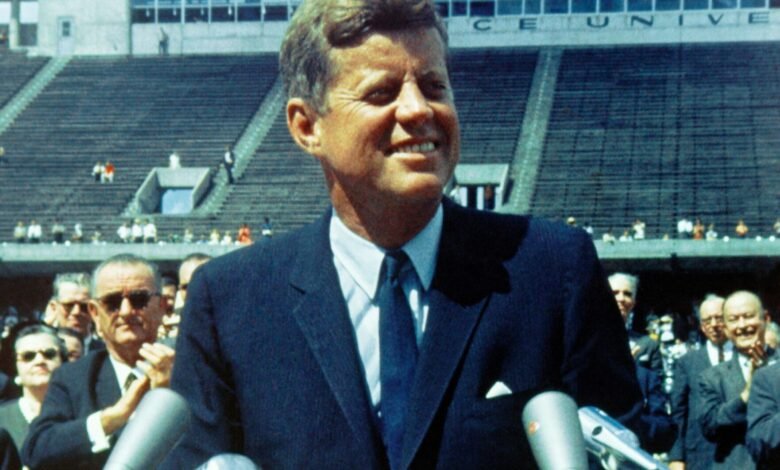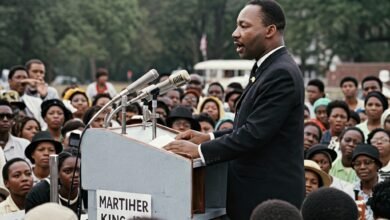
Early Life and Political Rise
John Fitzgerald Kennedy was born on May 29, 1917, into a prominent Irish-American family steeped in political involvement. His father, Joseph P. Kennedy Sr., was a successful businessman and served as the United States Ambassador to the United Kingdom. This politically charged environment had a significant impact on Kennedy’s formative years, instilling in him a keen interest in public service and governance. Growing up in the affluent Boston neighborhood of Brookline, he was exposed to the nuances of politics from an early age, which would shape his future endeavors.
Kennedy’s education at Harvard University was a crucial turning point in his life. He graduated in 1940 with a degree in Government, where he delved into various aspects of political theory and international relations. His senior thesis, which focused on British appeasement in the lead-up to World War II, would later be published as a book titled “Why England Slept.” This academic achievement underscored his analytical capabilities and his understanding of the complexities of global politics.
His military service during World War II further informed Kennedy’s political outlook. Serving as a naval officer in the South Pacific, he commanded a PT boat, and his heroism during a conflict with Japanese forces earned him the Navy and Marine Corps Medal. After returning from the war, Kennedy was inspired to enter politics, seeking to build a legacy rooted in service and sacrifice. In 1946, he was elected to the U.S. House of Representatives, representing Massachusetts’s 11th district. His time in the House honed his political skills and established his reputation as a dedicated public servant.
In 1952, Kennedy successfully ran for the U.S. Senate, where he continued to develop his leadership style and political ideology. His legislative focus often revolved around social issues, international affairs, and economic policies, which would become hallmarks of his presidency. Through his early life experiences and political ascent, Kennedy emerged as a hopeful leader, advocating for change and progress in America.
Key Policies and Accomplishments
President John F. Kennedy’s administration, which spanned from 1961 to 1963, was marked by a series of significant policies and accomplishments that aimed to instigate social change and bolster American values. One of his most notable triumphs was the promotion of civil rights, reflected in his strong support for the civil rights movement. Kennedy’s commitment to securing equal rights for all Americans culminated in his 1963 speech advocating for civil rights legislation, which laid the groundwork for the eventual enactment of the Civil Rights Act of 1964.
In addition to civil rights, Kennedy initiated a range of economic programs aimed at stimulating growth and reducing unemployment. His administration launched the New Frontier agenda, which sought to address economic stagnation through increased federal spending on education, healthcare, and infrastructure. Key initiatives such as the establishment of the Peace Corps highlighted his desire to improve international relations while enabling Americans to engage in service projects that foster global understanding and cooperation.
Kennedy’s foreign policy was characterized by both challenges and triumphs, with the Cuban Missile Crisis serving as a defining moment. In October 1962, when the United States discovered Soviet missile installations in Cuba, the crisis escalated to a tense standoff. Kennedy’s strategic approach, combining diplomatic negotiation with a naval blockade, ultimately resulted in the removal of the missiles and showcased his ability to navigate complex international tensions effectively. This conflict not only underscored Kennedy’s leadership but also reinforced a commitment to peace and diplomacy over military confrontation.
Overall, Kennedy’s presidency was marked by a clear vision for America—one that emphasized social justice, economic progress, and global peace. His policies not only transformed the landscape of American politics but also set the stage for future generations to pursue equality and opportunity in a rapidly changing world.
Challenges and Controversies
During his presidency, John F. Kennedy encountered a multitude of challenges and controversies, many of which significantly impacted his time in office and his legacy. One of the earliest and most notable controversies was the Bay of Pigs invasion in April 1961. This ill-fated operation intended to overthrow the Cuban government led by Fidel Castro, but it ultimately resulted in a humiliating defeat for the United States. The invasion exposed not only a lack of strategic planning but also raised questions about the effectiveness of CIA operations and the administration’s foreign policy decisions. In the aftermath, Kennedy accepted responsibility, which portrayed him as accountable but also highlighted the inherent dangers of Cold War politics.
Furthermore, the escalation of the Vietnam War presented another daunting challenge during Kennedy’s presidency. Initially advocating for limited military assistance to the South Vietnamese government, his administration gradually increased U.S. involvement. This decision stemmed from a desire to contain communism and prevent a domino effect in Southeast Asia. However, the deepening involvement would later lead to extensive military engagement and growing public dissent. Kennedy’s handling of the Vietnam situation reflected the complexities of Cold War strategies and the lasting implications of his choices on both domestic and foreign fronts.
In addition to foreign policy dilemmas, tensions within Kennedy’s administration created an internal political climate fraught with challenges. Disagreements among key advisors led to clashes over policy directions and strategies, revealing fissures within the robust façade of the New Frontier. Decisions surrounding civil rights demonstrated another layer of controversy, as Kennedy often sought to maintain political balance while addressing social justice issues. These various challenges outlined the turbulent context of his presidency and underscored the significant political pressures Kennedy faced as a leader, ultimately shaping the narrative of his administration and its enduring impact on American history.
Assassination and Legacy
On November 22, 1963, President John F. Kennedy was assassinated in Dallas, Texas, a tragic event that shocked the nation and reverberated around the world. The assassination marked a significant turning point in American history, leading to a period of national mourning. The immediate impact was profound, sparking widespread grief and disbelief across various sectors of society. As radio and television broadcasts delivered the news, Americans collectively grappled with the loss of a leader who was seen as a beacon of hope and change.
The public’s reaction to Kennedy’s assassination was marked by sorrow, anger, and a sense of vulnerability. Many viewed his death as a direct attack on the ideals of democracy and progress that he championed throughout his presidency. The subsequent investigation, spearheaded by the Warren Commission, sought to provide clarity around the circumstances of the tragic event, but it also contributed to a series of conspiracy theories that persist today.
Despite the somber nature of his assassination, John F. Kennedy’s legacy endures through the ideals he promoted, namely civil rights, space exploration, and public service. His vision of a “New Frontier” continues to resonate, influencing subsequent leaders and shaping American political discourse. Numerous honors and commemorations have been established in his name, including schools, monuments, and the Kennedy Center for the Performing Arts in Washington, D.C. Additionally, Kennedy’s impact on popular culture remains significant, as depicted in films, books, and documentaries that aim to capture his complex persona.
The ideals and bold initiatives of President Kennedy have left an indelible mark on American society. His enduring legacy serves as a continual reminder of the progress that can be achieved through visionary leadership and a commitment to public service. As we reflect on his contributions, it is clear that Kennedy’s influence will remain a relevant part of our national narrative for generations to come.






















